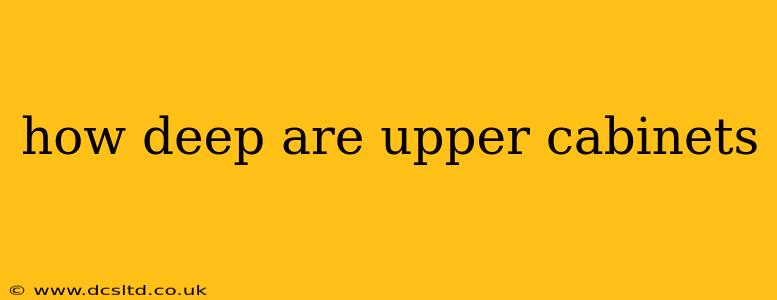The depth of upper kitchen cabinets is a crucial consideration in kitchen design, affecting both functionality and aesthetics. While there's no single answer, understanding the typical ranges and factors influencing depth choices will help you make informed decisions for your own kitchen. This guide explores the common depths, considerations for different kitchen styles, and answers frequently asked questions about upper cabinet dimensions.
What is the Standard Depth for Upper Kitchen Cabinets?
The standard depth for upper kitchen cabinets generally falls between 12 inches and 15 inches. However, this can vary depending on the overall kitchen design, the style of cabinets, and personal preferences. You might find some manufacturers offering slightly shallower or deeper options, but these dimensions remain the industry norm.
Are 12-Inch Deep Upper Cabinets Sufficient?
This is a common question, and the answer depends on your needs and the layout of your kitchen. 12-inch deep cabinets are often sufficient for storing frequently used items like dishes, glasses, and everyday cookware. However, they might limit storage space for bulkier items or less frequently used items.
What are the Advantages of Deeper Upper Cabinets (15 inches)?
15-inch deep upper cabinets offer considerably more storage capacity. They are better suited for storing larger items such as pots, pans, baking sheets, or even small appliances. The added depth can be particularly beneficial in smaller kitchens where maximizing storage is paramount.
What is the Difference Between Standard and Custom Upper Cabinets?
Standard cabinets come in pre-set sizes, typically falling within the 12-15 inch depth range. Custom cabinets offer more flexibility and can be designed to fit the exact specifications of your kitchen, including non-standard depths if desired. This is especially useful if you have unusual ceiling heights or specific storage requirements.
How Does Cabinet Depth Affect Kitchen Design?
The depth of your upper cabinets significantly impacts the overall feel and functionality of your kitchen. Shallower cabinets can make a small kitchen feel more open and less cluttered, while deeper cabinets provide more storage but might encroach on the available space and potentially feel more imposing. The overall style of the kitchen also plays a role; modern kitchens often favor shallower cabinets, while traditional kitchens might incorporate deeper options.
How Deep Are Upper Cabinets in Small Kitchens?
In small kitchens, maximizing space is key. Often, designers opt for shallower upper cabinets (12 inches or even less) to create a sense of openness and avoid making the space feel cramped. Clever storage solutions and careful planning are essential in these situations.
Can I Install Different Depths of Upper Cabinets in the Same Kitchen?
Yes, you can certainly mix and match upper cabinet depths in the same kitchen. This can be a particularly effective way to address varied storage needs in different areas. For instance, you might opt for deeper cabinets above the counter where larger items are stored and shallower cabinets in other areas to maintain balance.
What is the Ideal Depth for Upper Cabinets Above the Sink?
Above the sink, the depth of your upper cabinets is often dictated by the sink's dimensions and any plumbing fixtures. You might need to customize the depth here to accommodate the plumbing or to ensure enough clearance for easy use.
Conclusion: Choosing the Right Depth for Your Upper Cabinets
The ideal depth for your upper cabinets is a balancing act between aesthetics, functionality, and available space. Consider your kitchen's size, style, storage needs, and the frequency with which you'll access items stored in the upper cabinets. By carefully weighing these factors, you can make an informed decision that enhances both the beauty and the practicality of your kitchen. Consult with a kitchen designer for personalized advice tailored to your specific requirements.
